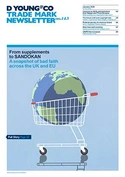SkyKick in practice: broad specification leads to finding of bad faith
The United Kingdom Intellectual Property Office (UKIPO) has applied the Supreme Court judgment in SkyKick UK Ltd and Anor v Sky Ltd and Ors ([2024] UKSC 36) (SkyKick) in case O/0439/24 regarding a UK trade mark application for ENERJO.
In May 2022, long before the SkyKick decision, Cashflow Corporation Ltd (the applicant) applied to register ENERJO for a specification spanning 13 classes. The application was opposed by SE Bicycles Company Limited (the opponent) based on Sections 5(2)(b) and 3(6) of the Trade Marks Act 1994
The 5(2)(b) ground relied on a standard likelihood of confusion assessment between ENERJO and a number of ENERGI logo marks. Whilst the opposition under this ground was rather more mundane, the decision provides a useful summary on the requirements for proving use of an earlier right. The burden lies with the proprietor to prove use through relevant UK evidence during the relevant time period. The opponent failed in this requirement. They had one registration that was not subject to proof, and the hearing officer’s analysis under this ground took a pragmatic approach considering the extreme length of the applicant’s specification, identifying a number of identical goods and noting that if the opposition failed for the identical goods then it would fail for the similar goods. Ultimately this ground did not succeed.
The 3(6) ground claimed bad faith on the basis the applicant did not have a bona fide intention to use ENERJO for all of the goods and services covered. The opponent noted the specification was 81 pages in length; the hearing officer claimed a page count of over 120, with either result suggesting an extensive list covering diverse terms from truncheons and knuckle dusters, to fish meal fertilizers, decompression chambers, aeroplanes, fur care, cleaning and repair, pleasure boat transport and golf course design with a host of varied goods and services in between. When filing the application, the applicant would have declared a bona fide intention to use across the terms covered. With such a broad specification, the opponent’s position was this declaration was false and the applicant had a dishonest state of mind or intention, filing the application with the intention of either undermining the interests of third parties or obtaining an exclusive right for purposes other than those falling within the functions of a trade mark.
The applicant did file a defence but only the opponent filed evidence in chief. There was not a hearing and only the opponent filed written submissions.
SkyKick was considered relevant in light of the opponent’s pleaded case under 3(6) and the opposition was suspended in April 2024 pending the outcome of the Supreme Court’s decision. Following the SkyKick decision, the opposition resumed in March 2025. The applicant filed submissions at this point which were vague, did not indicate any real business intention, and relied on the position that they had not covered all 45 classes. At no point did the applicant file evidence as to their commercial activities to explain why their broad specification may have been appropriate.
The hearing officer noted that “It is difficult to imagine that one business would use its trade mark to indicate to customers that it is responsible for providing goods and services as varied as those in the specification at issue”. Without any real justification from the applicant, the breadth of the “arbitrary and disparate” specification was sufficient to question whether the applicant had an intention to use the mark for all of the goods and services in the application. As the applicant failed to discharge the prima facie case against it, bad faith was found.
The ENERJO decision, whilst interesting due to the application of the findings in SkyKick, is a relatively straightforward example of bad faith considering the minor role the applicant played in defending their position.
As with SkyKick, this decision does not automatically equate broad specifications with bad faith. The UKIPO has subsequently issued Practice Amendment Notice 1/25 (PAN 1/25) which highlights the need for trade mark applicants to have a commercial rationale for the terms covered, particularly where specifications are broad and cover a range of seemingly unconnected goods and services. PAN 1/25 will lead to greater scrutiny of specifications at the application stage.
This article was first published by World Trademark Review, 03 July 2025.
Case details at a glance
Jurisdiction: UK
Decision level: UKIPO
Parties: Cashflow Corporation Ltd and SE Bicycles Company Limited
Citation: O/0439/24
Date: 09 May 2025
Decision (PDF): dycip.com/o043925-enerjo

